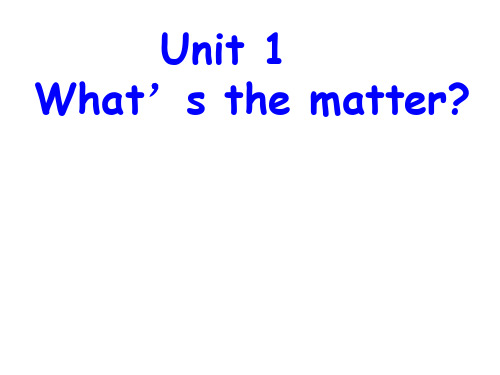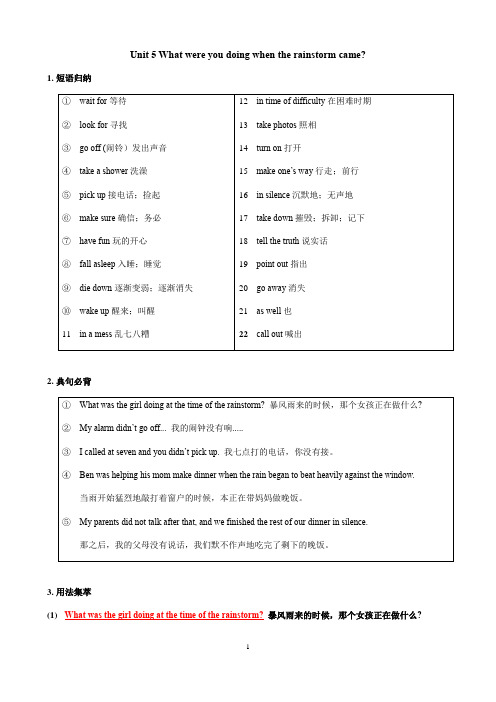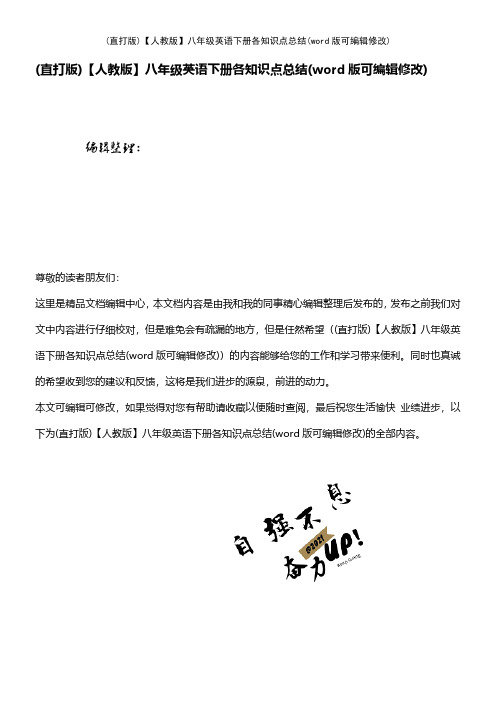人教版八年级下册英语复习资料(人教版)
人教版八年级英语下册unit1复习课(共36张PPT)

B
—Why are you so tired these days? —Well, I have A ___homework to do. A. too much B. too many C. much too D. many too
B delicious. — The meat is ____ — Yes, but don’t eat _____. A. too much; too much B. much too; too much C. too much ; much too D. much too; much too
--What shouldn’t he do?
--I think he shouldn’t …
shouldn’t = should not He has a sore throat
drink cold drink.
He shouldn’t eat ice cream.
eat hot food.
talk too much.
(2)主语+have/has+a+sore+发病部位
sore 是一个独立的形容词,指的是身体某一部位的酸痛。如:
sore back, sore throat,sore back,sore neck.
(3)主语+have/has+a+部位-ache
-ache作后缀,常与表示身体部位的名词合成一个新词, 表身体某部位疼痛,如:toothache , headache , stomachache .
---他应该去看牙医并且拍一个X片 子。 ---Does he have a toothache? ---Yes, he soes. --- He should see a dentist and get an X-ray.
人教版八年级下册英语Unit 5 知识点语法归纳总结

Unit 5 What were you doing when the rainstorm came?1.短语归纳2.典句必背3.用法集萃(1)What was the girl doing at the time of the rainstorm?暴风雨来的时候,那个女孩正在做什么?❖本句是特殊疑问句,时态是过去进行时,结构是“What+was/were+主语+doing+其他?”,用于询问某人在过去的某个时间正在做的事情。
例:—What were you doing at nine o’clock yesterday evening? 昨天晚上九点你正在做什么?—I was watching TV at home. 我正在家里看电视。
❖拓展:过去进行时描述过去某个时刻正在发生的动作或存在的状态,结构是“was/ were+动词的现在分词”。
例:When I got home my mother was cooking. 我到家的时候我妈妈正在做饭(2)My alarm didn’t go off... 我的闹钟没有响.....❖go off意为“(闹钟)发出响声”例:My alarm goes off at six every morning. 我的闹钟每天早晨6点响。
❖归纳:go off还有“离开”和“变质”之意。
例:Bob went off to get a drink. 鲍勃拿饮料去了。
Meat goes off quickly in hot weather. 热天肉变质得快。
❖拓展:go的短语(3)I called at seven and you didn’t pick up. 我七点打的电话,你没有接。
❖pick up意为“接电话”。
pick up有如下含义:(4)I called again at eight and you didn’t answer then either. 我八点再打来,你也没接。
最全面人教版八年级下册英语第一单元知识点归纳总结

Unit 1 What's the matter?一、词汇与短语◆重点单词A部分1.matter n. 问题;事情2.sore adj. 疼痛的;酸痛的3.stomachache n. 胃痛;腹痛4.foot n. 脚;足5.neck n. 颈;脖子6.stomach n. 胃;腹部7.throat n. 咽喉;喉咙8.hurt v. (使)疼痛;受伤9.fever n. 发烧10.passenger n. 乘客;旅客11.lie v. 躺;平躺12.break n. 间歇;休息13.rest v. &n. 放松;休息14.onto prep. 向;朝15.X-ray n. X射线;X光16.trouble n. 问题;苦恼17.toothache n. 牙痛18.hit n. (用手或器具)击;打19.headache n. 头痛20.herself pron. (she的反身代词)她自己21.off adv. & prep. 离开(某处);不工作;从……去掉B部分1.bandage n. 绷带v. 用绷带包扎2.press v. 压;挤;按3.sick adj. 生病的;有病的4.knee n. 膝;膝盖5.breathe v. 呼吸6.knife n. 刀7.sunburned adj. 晒伤的8.blood n. 血9.ourselves pron. (we反身代词)我们自己10.mean v. 意思是;打算11.climber n. 登山者;攀登者12.importance n. 重要性;重要13.risk n.&v. 危险;风险;冒险14.decision n. 决定;抉择15.accident n.(交通)事故;意外遭遇16.control v.&n. 限制;约束;管理17.situation n. 情况;状况18.spirit n. 勇气;意志19.kilo( = kilogram) n. 千克;公斤20.death n. 死;死亡21.rock n. 岩石22.nurse n. 护士◆重点短语A部分1.have a cold 感冒2.lie down 躺下3.have a stomachache 胃痛4.take one's temperature 量体温5.have a fever 发烧6.to one's surprise 使……惊讶的是7.get off 下车8.right away 立即;马上9.take breaks (take a break) 休息10.talk too much 说得太多11.drink enough water 喝足够的水12.have a very sore throat 嗓子非常疼13.get an X-ray 拍X光片14.see a dentist 看牙医15.drink some hot tea with honey 喝一些加蜂蜜的热茶16.put some medicine on sth.在……上面敷一些药17.feel very hot 感到很热18.sound like 听起来像19.all weekend 整个周末20.in the same way 以同样的方式21.go to a doctor 看医生22.go along 沿着……走23.on the side of the road 在马路边24.shout for help 大声呼救25.without thinking twice 没有多想26.have a heart problem 有心脏病27.thanks to 多亏了;由于28.in time 及时29.save a life 挽救生命30.get into trouble 陷入麻烦31.hurt oneself 受伤32.fall down落下;摔倒B部分1.be used to 习惯于……;适应于……2.in a difficult situation 在困境中3.take risks (take a risk) 冒险4.keep on doing sth. 继续(或坚持)做某事5.run out (of) 用尽;耗尽6.make a decision 作出决定7.cut off 切除8.get hit on the head 撞到头部9.get out of 离开;从……岀来10.be interested in 对……感兴趣11.give up 放弃12.mean doing sth. 意味着做某事13.put a bandage on sth. 用绷带包扎…14.lose one's life 失去生命15.feel sick 感到恶心16.mountain climbing 登山运动17.have problems breathing 呼吸困难18.be in control of 掌管;管理◆重点句子A部分1.What's the matter with you?=What's the trouble with you?=What's wrong with you?你怎么了?2.What should she do? 她该怎么办呢?3.Did you fall down? 你跌倒了吗?4.Should I take my temperature? 我应该量一下体温吗?5.I think I sat in the same way for too long without moving.我想我以同样的姿势一动不动地坐得太久了。
人教版八年级英语下册各知识点归纳总结(最新最全)

人教版八年级英语下册各知识点归纳总结Unti1 what’s the matter?短语归纳1.too much 太多2.lie down 躺下3.get an X-ray 做个X光检查4.take one ’s temperature 量体温5.put some medicine on ......在....上敷药6.have a fever 发烧7.take breaks /take a break 休息 8.without thinking twice 没多想9.get off 下车 10.take sb to the hospital 送某人去医院11.wait for等待 12.to one’s surprise 使.......惊讶的13.thanks to多亏于;由于 14.in time及时15.think about 考虑 16.have a heart problem患有心脏病用法归纳1.need to do sth .需要去做某事2.see sb doing sth 看见某人正在做某事3.ask sb sth 询问某人某事4.expect sb to do sth 期望某人做某事5.agree to do sth 同意做某事6.help sb (to) do sth 帮助某人做某事7.want to do sth 想要做某事 8.tell sb to do sth 告诉某人做某事9.have problems(in) doing sth 做某事有困难 e sth to do sth用某物去做某事语法点1.询问某人的健康问题及遇到麻烦的表达方法2.情态动词should的用法3.不定代词的用法精细解读1. What’s the matter (with you)? 怎么了?出什么事了?What’s the trouble/ the problem / wrong with sb./ sth.?2. I had a cold.我感冒了。
人教版八年级下册英语复习 Unit 5 重要短语、句型、重点讲解及作文范文

人教版八年级下册英语 Unit 1重要短语、句型、重点讲解及作文范文Unit 5 What were you doing when the rainstorm came?一、重点短语1. make sure 确信;确认2. beat against... 拍打… …3. fall asleep 进人梦乡;睡着4. die down 逐渐变弱;逐渐消失5. wake up 醒来6. in a mess 一团糟7. break.. . apart 使……分离8. in times of difficulty 在困难的时候9. at the time of 当.......时候10. go off (闹钟)发出响声11. take a hot shower 洗热水澡12. miss the bus 错过公交车13. pick up 接电话14. bring... together 使……靠拢15. in the area 在这个地区16. miss the event 错过这个事件17. by the side of the road 在路边18. the Animal Helpline 动物保护热线19. walk by 走路经过20. make one’s way to. •. 在某人去……的路上21. hear the news 听到这个消息22. important events in history历史上的重大事件23.for example 例如24.be killed 被杀害25.over 50 5 0多(岁)26. a school pupil 一个小学生27. on the radio 通过广播28.in silence 沉默;无声29. more recently 最近地;新近30.the World Trade Center 世贸中心31.take down 拆除;摧毁32.have meaning to 对……有意义33.remember doing sth. 记得做过某事34. at first 首先;最初第1页共6页二、重点句型1. — What were you doing at eight last night? — I was taking a shower. 我在洗淋浴。
(精校版)【人教版】八年级英语下册各知识点总结

(直打版)【人教版】八年级英语下册各知识点总结(word版可编辑修改)(直打版)【人教版】八年级英语下册各知识点总结(word版可编辑修改)
编辑整理:
尊敬的读者朋友们:这里是精品文档编辑中心,本文档内容是由我和我的同事精心编辑整理后发布的,发布之前我们对文中内容进行仔细校对,但是难免会有疏漏的地方,但是任然希望((直打版)【人教版】八年级英语下册各知识点总结(word版可编辑修改))的内容能够给您的工作和学习带来便利。同时也真诚的希望收到您的建议和反馈,这将是我们进步的源泉,前进的动力。本文可编辑可修改,如果觉得对您有帮助请收藏以便随时查阅,最后祝您生活愉快 业绩进步,以下为(直打版)【人教版】八年级英语下册各知识点总结(word版可编辑修改)的全部内容。(直打版)【人教版】八年级英语下册各知识点总结(word版可编辑修改)人教版八年级英语下册各知识点归纳Unti1 what’s the matter?短语归纳1.too much 太多 2.lie down 躺下 3.get an X-ray 做个X光检查 4.take one 's temperature 量体温 5.put some medicine on 。。。。..在。.。。上敷药 6.have a fever 发烧7.take breaks /take a break 休息 8.without thinking twice 没多想9.get off 下车 10.take sb to the hospital 送某人去医院
11.wait for等待 12.to one’s surprise 使..。。。..惊讶的
13。thanks to多亏于;由于 14。in time及时 15.think about 考虑 16。have a heart problem患有心脏病 17.get into the trouble 遇到麻烦 18.do the right thing做正确的事情事情
最新人教版英语八年级下册知识点(打印版)
Unit 1 What’s the matter?1. 学会谈论健康问题,健康状况(Talk about your health)2. 能够辨认身体部位。
(parts of the body)3. 能够提供建议(Give advice)1. head 头2. neck 颈部3. back 后背4. leg 腿5. arm 手6. hand 手7. foot 脚8. nose 鼻子9. eye 眼睛10. ear 耳朵11. mouth 嘴12. tooth 牙齿13. stomach 胃14. headache头痛15. toothache牙痛16. stomachache胃痛17. fever 发烧18. backache后背痛19. sore throat 咽部疼痛20. tired累的21. thirsty 口渴的22. hungry 饿的23. dentist 牙医1.have a stomachache 胃痛2.have a cold 感冒3.take one’s temperature 给某人量体温4.have a fever 发烧5.go to a doctor 看医生6.get off 离开,出发8.to one’s surprise令某人惊讶的是7.agree to (do sth) 同意做某事8.get into trouble 陷入麻烦9.fall down 摔打,10.thanks to幸亏,由于11.in time 及时12.give up doing sth 放弃13.be interested in 对......感兴趣14.cut off 砍到,切碎1.What’s the matter? 怎么了?2.I have a stomachache. 我胃痛。
3What should I do?我应该做什么?3.I think you should lie down and rest. 我认为你应该躺下休息4.If your head and neck still hurt tomorrow,then go to a doctor. 如果你的头和脖子明天仍然痛,那么去看医生吧。
Unit 1 单元知识梳理-八年级英语下册(人教版)
练习二 • 1. 发烧 • 2. 咳嗽 • 3. 牙疼 • 4. 说得太多 • 5. 喝足够的水 • 6. 受凉;感冒 • 7. 胃疼 • 8. 背疼 • 9. 喉咙痛 • 10. 躺下来休息 • 11. 加蜂蜜的热茶 • 12. 看牙医
take him to see a doctor. 8.— Do you want to go to Harbin?
— No. We’ve made a d ecision to go to Sanya. 9. We were tired and we wanted to have a good rest 10.— What does his mother do?
( C )My watch has broken. ( E )Tom broke the silence.“Is she always late?” he asked. ( G )They are taking a short break in Spain.
4.mean A.(v.)意思是;B.(v.)打算,有意,意欲;C.(v.)意味着;D.(adj.)吝啬 的;E.(adj.)刻薄的;F.(adj.)平均的;G.(n.)平均值
• 27. to one’ s surprise • 28. thanks to • 29. in time • 30. save a life • 31. get into trouble • 32. right away • 33. because of • 34. get out of • 35. hurt oneself • 36. put a bandage on sth. • 37. fall down • 38. feel sick • 39. have a nosebleed
期末Units1-10单元知识点总结 人教版八年级英语下册
Unit 1 What’s the matter?一、词形变化1.stomach 名词胃;腹部——stomachache 名词胃痛2.lie 躺lie—lay—lain lying; 说谎lie—lied—lied3.hurt 动词(使)疼痛;受伤hurt—hurt—hurt4.hit 动词击;打hit—hit—hit5.反身代词(oneself):myself 我自己—ourselves 我们自己himself 他自己—herself 她自己—themselves 他们自己yourself 你自己—yourselves 你们自己enjoy oneself 玩得开心hurt oneself 伤害自己by oneself 独自6.climb 动词登;爬——climber 名词登山者7.knife 名词小刀——复数:knives8.mean 动词意思是;打算mean—meant—meant9.important 形容词重要的—importance 名词重要性10.decide 动词决定——decision 名词11.die 动词死——death 名词死亡——dead形容词死亡的die—died—died dying二、短语归纳1.lie down 躺下to one’s (my/his/her...) surprise 令某人惊讶的是2.take one’s (my/your/his/her..) temperature 量体温3.take a break = take breaks 休息take a risk = take risks冒险4.run out 物做主语:The money ran out. 钱用光了。
run out of 人做主语:I ran out of money. 我用光了钱。
5.make a decision = make decisions 做决定6.be in control of 掌管He is in control of the company. 他掌管公司。
人教版八年级英语下册各单元知识点总结完整版
Unit 1 What’s the matter?一、重点短语1. have a fever 发烧2. have a cough 咳嗽3. have a toothache 牙疼4. talk too much 说得太多5. drink enough water 喝足够的水6. have a cold 受凉;感冒7. have a stomachache 胃疼8. have a sore back 背疼9. have a sore throat 喉咙痛10. lie down and rest躺下来休息11. hot tea with honey加蜂蜜的热茶12. see a dentist看牙医13. get an X-ray拍X光片14. take one’ s temperature量体温15. put some medicine on sth在……上面敷药16. feel very hot 感到很热17. sound like 听起来像18. all weekend 整个周末19. in the same way以同样的方式20. go to a doctor 看医生21. go along 沿着……走22. on the side of the road 在马路边23. shout for help 大声呼救24. without thinking twice 没有多想25. get off 下车26. have a heart problem 有心脏病27. to one’ s surprise 使……惊讶的28. thanks to 多亏了;由于29. in time及时30. save a life 挽救生命31. get into trouble 造成麻烦32. right away 立刻;马上33. because of 由于34. get out of 离开35. hurt oneself 受伤36. put a bandage on sth. 用绷带包扎37. fall down 摔倒38. feel sick 感到恶心39. have a nosebleed 流鼻血40. cut his knee割伤他的膝盖41. put her head back 把她的头向后仰42.have problems breathing呼吸困难43. mountain climbing登山运动44. be used to doing sth. 习惯做某事45. run out (of) 用完;用尽46. so that 以便47. so…that 如此……以至于……48. be in control of 掌管;管理49. in a difficult situation 在逆境屮50. keep on doing sth.坚持做某事51. make a decision做出决定52. take risks 冒险53. give up 放弃二、知识点解析1. What’s the matter? 怎么了?若是询问“某人怎么了?”要用“What’s the matter with sb.?”拓展:What’s the matter with sb.? 的同义句:What’s wrong with sb.? / What’s the trouble with sb.?2.疾病类短语:have a +疾病. e.g. :have a fever 发烧have a cold 感冒have a cough 咳嗽.have a +身体部位-ache. e.g.: have a headache 头痛have a toothache 牙痛.have a sore+身体部位. e.g.: have a sore throat咽喉痛have a sore back背痛例题:Mom, I____________.I’m sorry to hear that, dear. We must go to see the dentist right away.A. have a headacheB. have a stomachacheC. have a toothacheD. have a fever3. lie down 躺下V. 躺,平躺。
- 1、下载文档前请自行甄别文档内容的完整性,平台不提供额外的编辑、内容补充、找答案等附加服务。
- 2、"仅部分预览"的文档,不可在线预览部分如存在完整性等问题,可反馈申请退款(可完整预览的文档不适用该条件!)。
- 3、如文档侵犯您的权益,请联系客服反馈,我们会尽快为您处理(人工客服工作时间:9:00-18:30)。
人教版新目标八年级下册英语复习资料 Unit 1 1. People will have robots in their homes. 人们家里将会有机器人。 will助动词,表单纯的未来。用于陈述句表“将……,会……”。 e.g. I will (I'll) be 15 next month.下个月我就15岁了。Mr. Green will be back soon. 否定句:won't = will not eg. He won't be back before 10. will用于疑问句意为“会……吗?”e.g. Will you be free on Friday evening? Will people have robots? 2. There will only be one country.将会只有一个国家。 There will be 是there be句型的将来时。 e.g. There won't be any paper money. (否定)Will there be less pollution? (疑问) Yes, there will./ No, there won't.There will be more people. (肯定) ※常见错误:there will have… 3. I think there will be more / less pollution. 我认为将会有更多/更少的污染。 fewer 与less及more表数量的用法。 (1) few(形容词)“几乎没有,很少的”,修饰可数名词。其比较级、最高级为规则变化:few-fewer-fewest。“a few”表示“一些”,“few”带否定含义,“几乎没有”。 例:a few days ago, for a few weeks, He has few friends here. There will be fewer trees. (2)little(形容词)“很少的,几乎没有的”(“小的,幼小的”),修饰不可数名词。其比较级、最高级为不规则变化:little-less-least。“a little”表“一些”,“little”带否定含义,“几乎没有”。 例:There’s little food left. We have to buy some. There’s a little water in the cup. (3)many“许多”,修饰可数名词。much“许多”,修饰可数名词。 many / more比较级、最高级为不规则变化:many / much -more-most。 例:I have many magazines. She has more magazines. But he has the most. There will be more people on the earth in future. More and more students start to exercise more every day to keep fit. 4. in 与 after的区别 例句:I'll be back in half an hour. 我半小时后就回来. 本句中的in作"以后"解,不能用after代替。 after和in都可以表示"以后"的意思,其区别是: 1)after以过去为起点,表示过去一段时间以后,常用于过去时态的句子。例如: They started working after lunch. 他们是午餐后开始工作的。 The film was shown after the meeting. 电影是会议结束以后放的。 2)in以现在为起点,表示将来一段时间以后,常用于将来时态的句子。如: They will start working in half an hour. 他们将在半小时后开始工作。 The film will be shown in 2 or 3 days. 这部电影将在两三天后上映。 3)在某个特定的时间以后,after也可用于将来时态的句子。例如: They will start working after 10 am. 他们将在上午10点以后开始工作。 The film will be shown after 5 o'clock. 这部电影将于4点以后上映。 4) “after+一段时间”或“一段时间+later”表示“(在过去某个时间看来)一段时间之后”。 He went home after two days. 他两天后回家了。 Three years later,she had a baby. 三年后,她生了一个婴儿。 5. fall in love with 爱上… fall in love with a girl 爱上一个女孩 fall in love with a country 爱上一个国家 [注] fall 是“陷入”的意思. 它与feel(感觉)很像。fall→fell→fallen feel→felt→felt. 6.alone adj.(只作表语) adv. 独自;单独 He was alone in the house他一个人在屋里 。 I went to the movies alone,I felt lonely. 我独自去看电影了,我觉得很孤独。 [注] alone 表示“单独的,独自一人的”,不含感情色彩.做形容词时,只能在be动词或系动词之后做表语与lonely不同,lonely表示“孤独的,寂寞的”含有丰富的感情色彩.lonely做形容词时,可做定语和表语。如: a lonely village 孤寂的村庄. 7.keep vt.& vi. keep 有好几个意思,在本课中做“饲养;喂养”讲,相当于feed。 keep a pet parrot 养一只宠物鹦鹉 feed a cat with fish 给猫喂鱼 (1)保住;保留:I’ll try my best to keep my job. 我要尽力保住我的工作。 (2)保守(秘密):keep a secret(这对我来说可是太难了) (3)保持(某状态):Keep silent! 保持沉默! Keep top side up! 请勿倒放!(“保持上方朝上”不就是“请勿倒放”吗?) (4)继续;持续:They kept walking. 他们继续步行。 8.That may not seem possible now.那可能现在看上去不可能。 seem 是连系动词,意为“似乎”、“好像”、“看上去”,用来表示说话人内心的、有一定依据的推测、判断或猜想。其主要用法如下: 1. seem 后面接动词不定式 to do ,构成固定词组:seem to do sth”似乎要...”。 例: My father seemed to know the news. 我父亲好像知道这个消息。 2. “It seems/seemed that.从句..” 例如: It seemed that you were lying. 看来你在撒谎!
语法 1) 一般将来时 1.用be doing表示将来:主要意义是表示按计划、安排即将发生的动作,常用于位置转移的动词。 如:go, come, leave, arrive等,也可用于其他动作动词。 We are having fish for dinner. We are moving to a different hotel the day after tomorrow. 这种用法通常带有表示将来的时间状语,如果不带时间状语,则根据上下文可表示最近即将发生的动作。 2.用be going to do表示将来:主要意义,一是表示“意图”,即打算在最近的将来或将来进行某事。 Are you going to post that letter? How long is he going to stay here? 另一意义是表示“预见”,即现在已有迹象表明将要发生或即将发生某种情况。 It’s going to rain. 3. 用will/ shall do表示将来:主要意义,一是表示预见。 She will come to have class tomorrow. She won’t come to have class tomorrow. 4. 用一般现在时表示。 根据规定或时间表预计要发生的动作,在时间和条件状语从句中,都可用一般现在时表示将来时。如: 1. The new term starts (begins) on August 29th. 新学期八月二十九日开学。 2. If it doesn’t rain tomorrow, we will go out for a picnic. 如果明天不下雨,我们将出野餐。 3. I’ll call you as soon as he gets home. 他明天一到家我就打电话通知你。 2) There be结构 英语中,There be句型表示“某处有某人或某物”。 例如:There are always more than one hundred birds in the big tree every evening. 每天傍晚那棵大树上总会有100多只小鸟。 一、There be句型的用法: 1)There与be中间可插入一些表示推测的情态动词、表示时态的短语和一些动词短语,以强调某种语气。 例如:There must be some flowers in the box. 盒子里肯定有些鲜花。 There will be a meeting this afternoon.注意:be不能换成have及have的变化形式。 2)There be句型常与过去时间状语连用,构成一些固定句型,用于故事发生的开头,交代故事发生的时间。 例如:Many years ago,there was such a beautiful girl called Cindy.很久以前有一个叫Cindy的美丽女孩。 3)There be句型中,动词be单复数形式要跟there be之后的真正的主语一致。并且要根据 就近一致原则来变换be的单复数形式。
